“Sheku IS Fambul Tok,” said John Caulker (the ED of Fambul Tok) when we spoke after learning of the sudden passing last week of one of the founding leaders of Fambul Tok, our dear colleague, friend and brother, Sheku Koroma. And while John’s statement helps explain the depth of the shock and grief at Sheku’s loss, it also illuminates a core strength, promise and power of Fambul Tok, and indeed of Sheku’s legacy.
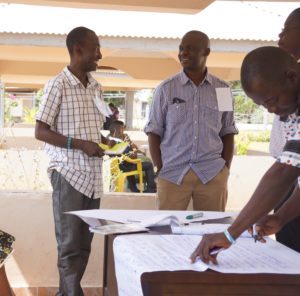
Sheku Koroma and John Caulker at a staff meeting, 2012
By his statement, John wasn’t meaning Sheku was an isolated individual holding all of the power and responsibility for Fambul Tok. Rather, he was referring to the degree to which Sheku embodied the values and process commitments core to the way Fambul Tok works – values built on the assumption of the fundamental wholeness, integrity and capacity of individuals and communities. Through this embodiment, Sheku led in inculcating those values in the staff and imprinting them into the very fabric of Fambul Tok organizationally – and thereby in its work in communities.
He showed us how valuing how we are in the world even more than how much we accomplish can unleash huge transformational potential.
Sheku was John’s colleague and partner from the beginning of Fambul Tok – before the beginning, actually, having worked many years with John at Forum of Conscience, the Fambul Tok precursor. His love of his country and deep respect for its culture undergirded his gentle but firm persistence advocating for the wholeness and integrity of people and communities.
These qualities were foundational to Fambul Tok’s use of an ‘Emergent Design’ approach, involving piloting each program iteration, then reflecting on and refining it before growing the process into other areas. For the first six months of the program, the pioneering Fambul Tok staff piloted a process in Kailahun district to foster community-owned-and-led reconciliation, drawing on the rich Sierra Leonean culture of communal acknowledgement, apology and forgiveness for social wrongs. Sheku was a key member of our first leadership retreat in Vermont (USA) the summer of 2008, which provided a time to reflect on the process and begin to systematize the program for expansion into other districts. As we reflected on and gave language to the process that John, Sheku and the rest of the staff had been using, the skillful and intuitive genius with which they were living into a process for enlivening communities – even after the devastation of the 11-year civil war – was strikingly evident. In this reconciliation context, the staff’s years of human rights and community mobilization experience was coming to full and innovative fruition.
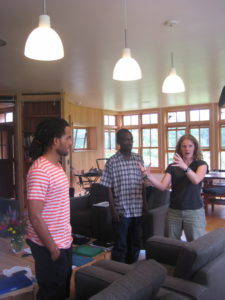
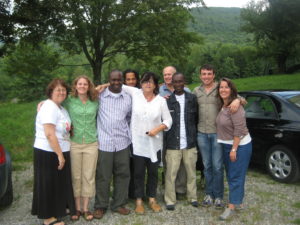
The program and processes we designed and refined in those meetings, and the words we gave to them, have had power and impact because they emerged from the integrity of lived lives, from embodied qualities of character. Six months later, at the end of Fambul Tok’s first full year of operating, we held our first staff retreat in Sierra Leone, in Sheku’s home town of Bo. An important part of this meeting was articulating the Fambul Tok values – and this meant drawing from the deepest selves and the lived experience of the team in its work in communities over the last year. This articulation of the Fambul Tok values in turn became the pillar of all of Fambul Tok’s work going forward.
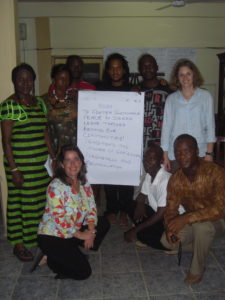
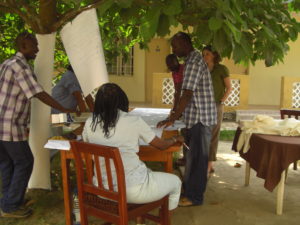
Embodying these values individually and as a team is what helped build the social infrastructure for community rebirth and renewal across Sierra Leone. It enabled an extraordinary group of founding leaders, of which Sheku was a shining exemplar, to seed a national – nay, global – movement.
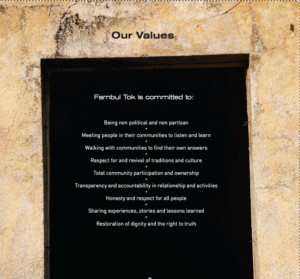 I was always impressed and inspired watching Sheku in action in community settings. I was privileged to accompany Sheku and the team as they launched Fambul Tok’s work in Pujehun District in the spring of 2013. Fambul Tok begins its work in a new section (collection of villages) by calling an initial sectional ‘Stakeholder’s Meeting,’ where the Fambul Tok process and values are explained to a cross section of local leaders, so they can decide if they want to engage in the Fambul Tok process in their section. Once this decision is made, the representatives are invited and empowered to begin the process of identifying the community members they want to lead the process going forward, to be chosen based on their expression of certain qualities core to Fambul Tok’s success – qualities like community-mindedness, unselfishness, capacity to communicate, and being non-political.
I was always impressed and inspired watching Sheku in action in community settings. I was privileged to accompany Sheku and the team as they launched Fambul Tok’s work in Pujehun District in the spring of 2013. Fambul Tok begins its work in a new section (collection of villages) by calling an initial sectional ‘Stakeholder’s Meeting,’ where the Fambul Tok process and values are explained to a cross section of local leaders, so they can decide if they want to engage in the Fambul Tok process in their section. Once this decision is made, the representatives are invited and empowered to begin the process of identifying the community members they want to lead the process going forward, to be chosen based on their expression of certain qualities core to Fambul Tok’s success – qualities like community-mindedness, unselfishness, capacity to communicate, and being non-political.
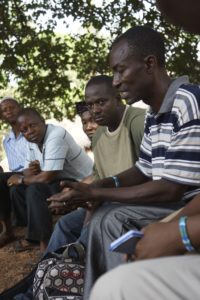
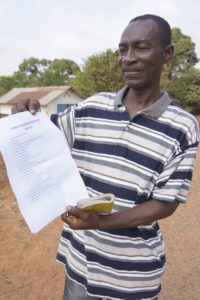
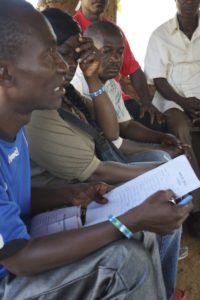
Because Fambul Tok operates so differently from other NGOs these communities will likely have encountered, it requires careful explanation and reiteration to make sure the processes and values are communicated and understood, so that the community members understand from the beginning that the process will be theirs. Since the goal is not to bring solutions from the outside, but rather to initiate and facilitate a locally-owned process, this communication is critical. But while finding the right words is important, the spirit of empowering local leadership gets communicated by actions and demeanor, even more than words. Sheku’s genius at facilitating these conversations was rooted in the full circle integrity with which he not only understood but lived out the values he was communicating, fully respecting the integrity and capacity – expressed and latent – of the people he was meeting. A natural educator, watching him work in a community was watching him, in essence, just being himself.
Sheku Koroma in Pujehun, Sierra Leone from Catalyst For Peace on Vimeo.
By seeing and calling forth the leadership potential of the communities most impacted by war, and later Ebola – the very people and places that most of the rest of the world saw only in terms of their victimhood – Sheku helped Fambul Tok create the space for regenerated communities. Walking alongside these communities, also with leadership from Sheku, Fambul Tok has been carving the channels for community leadership of a nationwide reconciliation and renewal process.
A powerful way to honor Sheku’s life and spirit would be to work so that this process continues and grows. To commit to our own embodiment of the persistent unselfishness and powerful community-mindedness he lived and taught. To come together in ways that invite others to rise to their better selves as well – for the good of our communities, our countries, and our world.
So, in Sheku’s spirit, I make the commitment to do that to the best of my ability. And I invite us all to do the same.
for other tributes to Sheku, see these posts.

